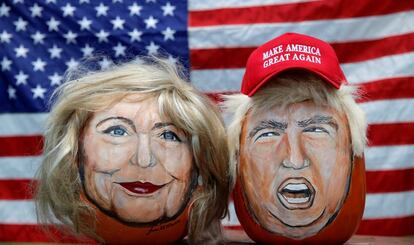Hillary Clinton seeks Democratic unity ahead of battle with Trump
The presumptive candidate for the White House race will start the campaign in a strong position, thanks to successes in primaries


Hillary Clinton, who is set to become the first female presidential nominee for her party, is entering a new phase. After several primary victories on Tuesday, she became the presumptive Democratic candidate in November’s elections. But first, she must unite the party and draw in those who voted for her Democratic rival, Bernie Sanders. She will also announce her vice presidential pick within the next few weeks.
The former secretary of state reached the number of pledged delegates necessary to clinch the Democratic nomination earlier this week. Clinton will run against Republican presumptive nominee Donald Trump, a real estate magnate and reality TV star who unexpectedly seized the Republican ticket a month ago with his xenophobic remarks and protectionist rhetoric.
Clinton’s victory over Sanders in California, the most populous and one of the most progressive states, is the culmination of more than a year of primaries and caucuses, which began on the freezing plains of Iowa and will end next Tuesday with the last, and now nominal, Washington D.C. primary.
After 56 presidential elections and 44 leaders, the United States can only count one Catholic and one African American among its list of commanders-in-chief, and not a single woman
There will be little time left to reflect on Hillary Clinton’s milestone accomplishment. Israel, Liberia, Pakistan, Brazil, the United Kingdom, Chile, Germany and other countries have already had female heads of state and presidents. Yet, after 56 presidential elections and 44 leaders, the United States can only count one Catholic and one African American among its list of commanders-in-chief, and not a single woman.
“Tonight’s victory is not about one person,” Clinton said on Tuesday night in New York. “It belongs to generations of women and men who struggled and sacrificed and made this moment possible.”
Getting here has not been easy. Clinton has been in politics for four decades. In 1972 she was already campaigning for the progressive Democrat George McGovern, a Sanders type avant la lettre. When her husband, Bill, won the primaries in 1992, he told supporters they had gotten two for the price of one: a co-presidency.
Elected senator for New York in 2000, Clinton made her first bid for the presidency in 2008. She was the favorite to win the Democratic primary race but ran into Barack Obama, an African American senator from Illinois who rode a wave of enthusiastic popular support and hope for change all the way to the White House. Obama won the Democratic nomination and became the first black president of the United States, a country with a long history of slavery and segregation. President Obama named Clinton secretary of state.
Clinton does not have the charm of her husband Bill. People criticize her lack of empathy, her apparent inability to show enthusiasm. “I am not a natural politician, in case you haven’t noticed,” she admits. Her speeches are boring compared to those of her Republican adversary, Donald Trump, a showman who can hypnotize audiences with his unpredictable and inappropriate remarks and broadsides. Trump has monopolized hours and hours of TV while Clinton has been relegated to second place in election coverage.
Clinton does not have the charm of her husband Bill. People criticize her lack of empathy, her apparent inability to show enthusiasm
In the year of rebel candidates like Trump and Sanders, Clinton came to represent the establishment – political and economic elites. That she has won the Democratic primary race by more than 3.5 million votes begs observers to review the theory that voters reject said establishment. Not everyone shares the frustration that Trump and Sanders voters feel. Some believe that Clinton’s reformist style – making small advances and agreements stitched together with tenacity and persuasion – will be more effective than Trump’s apocalyptic proclamations or Sanders’ revolutionary promise.
Eight years after the United States elected its first black president and the same year that Democrats chose a female presidential nominee, Republicans bring forth Donald Trump, a candidate whose own party leaders have criticized for his racist and sexist remarks.
Though Clinton has the support of a broad coalition of African Americans, Hispanics and women, she needs to expand it to include leftist Sanders voters and moderates. Maybe even pull in those Republicans who are frightened by the prospect of Donald Trump as commander-in-chief.
English version by Dyane Jean François.
Sign up to our newsletter
EL PAÍS English Edition has launched a weekly newsletter. Sign up today to receive a selection of our best stories in your inbox every Saturday morning. For full details about how to subscribe, click here.
Tu suscripción se está usando en otro dispositivo
¿Quieres añadir otro usuario a tu suscripción?
Si continúas leyendo en este dispositivo, no se podrá leer en el otro.
FlechaTu suscripción se está usando en otro dispositivo y solo puedes acceder a EL PAÍS desde un dispositivo a la vez.
Si quieres compartir tu cuenta, cambia tu suscripción a la modalidad Premium, así podrás añadir otro usuario. Cada uno accederá con su propia cuenta de email, lo que os permitirá personalizar vuestra experiencia en EL PAÍS.
¿Tienes una suscripción de empresa? Accede aquí para contratar más cuentas.
En el caso de no saber quién está usando tu cuenta, te recomendamos cambiar tu contraseña aquí.
Si decides continuar compartiendo tu cuenta, este mensaje se mostrará en tu dispositivo y en el de la otra persona que está usando tu cuenta de forma indefinida, afectando a tu experiencia de lectura. Puedes consultar aquí los términos y condiciones de la suscripción digital.








































